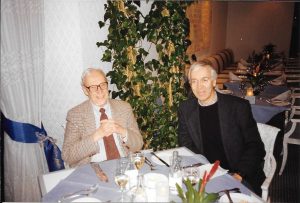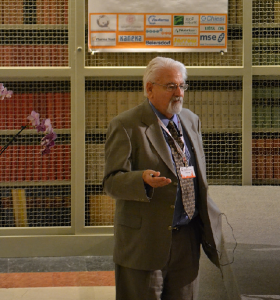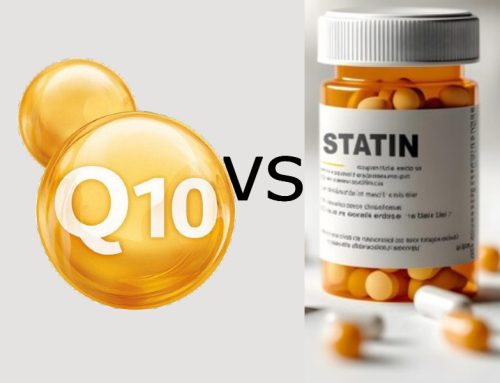
Dr. Karl Folkers (left) and Dr. Svend Aage Mortensen (right) together with Dr. William Judy and Dr. Per Langsjoen were pioneers in the adjunctive treatment of heart failure patients with Coenzyme Q10. Their studies showed that Coenzyme Q10 supplementation improves the symptoms and survival of heart failure patients. Moreover, withdrawal of the Coenzyme Q10 adjunctive therapy leads to clinical relapse.
Coenzyme Q10 as an adjunctive therapy added to conventional medication improves the symptoms and the survival of heart failure patients. It reduces the number and length of hospitalizations of heart failure patients.
We know this from the documented results of randomized, double-blind, placebo-controlled studies [Morisco; Munkholm; Mortensen].
Coenzyme Q10 adjunctive therapy for heart failure
Recently, Dr. William Judy, founder and president of SIBR Research Institute, told me about an interesting outcome of the early Coenzyme Q10 studies with heart failure patients.
Dr. Judy and Dr. Svend Aage Mortensen, in separate studies in the late 1980s and early 1990s, had the same experience:
- They put their heart failure patients on Coenzyme Q10 adjunctive therapy.
- They saw a significant improvement in the patients’ symptoms and quality of life.
- They took the patients off the Coenzyme Q10 therapy, assuming the improvement was permanent.
- They saw many of the heart failure patients suffer a clinical relapse after the Coenzyme Q10 treatment had been discontinued.
Coenzyme Q10: Life-long therapy for heart failure patients
To the surprise of the researchers – this was still early days in Coenzyme Q10 research – many of the heart failure patients, deprived of the extra Coenzyme Q10, had suffered a relapse [Judy; Mortensen].
These clinical results – clinical relapse after the cessation of Coenzyme Q10 therapy – led the leading Coenzyme Q10 researchers in the 1990’s, Dr. Karl Folkers, Dr. William Judy, Dr. Per Langsjoen, Dr. Gian Paolo Littarru, Dr. Svend Aage Mortensen among them, to the conclusion that Coenzyme Q10 supplementation has to be a “life-long therapy for heart failure patients.”
An amazing Coenzyme Q10 story from 1992

Dr. William V. Judy, president of the SIBR Research Institute, has been involved in Coenzyme Q10 clinical research from the beginning. He has supervised important studies of the effect of Coenzyme Q10 on heart failure patients, cardiac surgery patients, and low-energy syndrome patients.
Dr. Judy told me the most fantastical story, which, incidentally, has been reported in the Texas Monthly magazine [Sharpe]. It seems that the US FDA completely misunderstood the implications of the cases of clinical relapse when heart failure patients had been taken off Coenzyme Q10 adjunctive therapy. The FDA moved to ban the use of Coenzyme Q10 supplements [Judy; Sharpe].
The, following the lead of the US FDA, the Texas Department of Health attempted to remove Coenzyme Q10 nutritional supplements from retail shelves in Texas [Sharpe].
Coenzyme Q10 wins FDA approval as GRAS (“Generally Regarded As Safe”)
Several things happened in reaction to the removal of Coenzyme Q10 from retail store shelves.
- Heart failure patients in Texas, the patients of cardiologist Dr. Per Langsjoen, organized and protested the action of the Texas Department of Health [Sharpe].
- Dr. Judy, who had been conducting Coenzyme Q10 research at Methodist Hospital in Indianapolis, took this issue to Mr. Dan Burton (Senator from Indiana). Senator Burton was the chairman of the Senate committee that did oversight on the sale of drugs and natural products in the USA. Senator Burton agreed that Coenzyme Q10 belonged on the FDA’s list of natural products that are safe for use over-the-counter. Moreover, he could see from the clinical trial data that Coenzyme Q10 is effective in improving the symptoms of heart failure patients [Judy].
- The Coenzyme Q10 researchers in the US – Dr. Folkers, Dr. Judy, Dr. Langsjoen – appealed to the FDA for permission to put their patients back on the Coenzyme Q10 adjunctive treatment. Basically, they had to persuade the FDA that there were sufficient empirical data to declare Coenzyme Q10 as GRAS (= generally regarded as safe).
- Dr. Mortensen helped from Denmark by having a prominent professor in England write to the FDA about the safety of the nutritional supplement. The professor emphasized in his letter that the clinical relapses upon withdrawal of the Coenzyme Q10 adjunctive therapy actually served to prove the essential function of Coenzyme Q10 in the heart muscle cells.
To recapitulate, the crucial sequence seen in the clinical trials was threefold:
- The heart failure patients improved significantly when Coenzyme Q10 was added to their conventional medication.
- Many heart failure patients showed signs of significant clinical relapse when the Coenzyme Q10 adjunctive treatment was withdrawn.
- The heart failure patients who had suffered relapses responded a second time when the Coenzyme Q10 adjunctive treatment was re-instated.
Confirmation of Coenzyme Q10’s efficacy in heart failure cases
The data from more recent clinical trials has confirmed that Coenzyme Q10 is a safe and effective adjunct therapy for heart failure patients:
- Morisco: the addition of Coenzyme Q10 treatment to conventional heart failure therapy significantly reduced the need for hospitalization and the risk of serious complications.
- Munkholm: the supplementation of serious heart failure patients with Coenzyme Q10 significantly improved several symptoms of the disease including the stroke index at rest and at work, the pulmonary artery pressure at rest and at work, and the pulmonary capillary wedge pressure at rest and at work.
- Mortensen: the adjunctive treatment of patients with chronic heart failure was safe, improved symptoms, and reduced major adverse cardiovascular events.
Conclusion: Adjunctive Coenzyme Q10 therapy essential for heart failure patients
Back in 1992 at the time of the controversy over the sale of Coenzyme Q10 over the counter, the sales of Coenzyme Q10 nutritional supplements in the USA were small. In the past 35 years, however, the sales of Coenzyme Q10 in the USA have grown to the point that approximately 3 million individuals take a Coenzyme Q10 supplement every day. Coenzyme Q10 is reported to be the third highest selling supplement in the natural products industry in the USA [Judy].
3 million Americans taking a Coenzyme Q10 capsule every day. It sounds impressive.
It sounded impressive until I saw the Centers for Disease Control report that there are about 5.7 million heart failure patients in the USA and that about half of all heart failure patients die within five years of diagnosis. Treatment of heart failure patients costs the US heart care system some $30.7 billion dollars per year [Centers].
Then I thought: many more Americans need to be taking a well-formulated daily Coenzyme Q10 supplement.
I am taking the daily Coenzyme Q10 supplement because I do not want to get heart failure.
Read our key article about CoQ10 and cardiovascular health in elderly people
Read our key article on CoQ10 as adjuvant therapy for heart failure
Sources
Baggio, E., Gandini, R., Plancher, A.C., Passeri, M., & Carmosino, G. (1994). Italian multicenter study on the safety and efficacy of coenzyme Q10 as adjunctive therapy in heart failure. Mol Aspects Med., 15 Suppl:s287-94.
Centers for Disease Control. (2017). Heart failure fact sheet. Retrieved from https://www.cdc.gov/dhdsp/data_statistics/fact_sheets/fs_heart_failure.htm.
Judy, W. V. (2017, December). Personal interview.
Morisco, C., Trimarco, B., & Condorelli, M. (1993). Effect of coenzyme Q10 therapy in patients with congestive heart failure: a long-term multicenter randomized study. The Clinical Investigator, 71(8 Suppl), S134-S136.
Mortensen, S.A., Vadhanavikit, S., Baandrup, U., & Folkers, K. (1985). Long-term coenzyme Q10 therapy: a major advance in the management of resistant myocardial failure. Drugs Exp Clin Res., 11(8):581-93.
Munkholm, H., Hansen, H. H., & Rasmussen, K. (1999). Coenzyme Q10 treatment in serious heart failure. Biofactors (Oxford, England), 9(2-4), 285-289.
Sharpe, P. (1992, June). Heartless behavior. Texas Monthly. Retrieved from https://www.texasmonthly.com/articles/heartless-behavior/
Disclaimer: The information in this review article is not intended as medical advice and should not be construed as such.








Leave A Comment